Brutal Love and The Truth of Raising Champions
Story by Tetsuhiko Endo | Photos by Quinn Mathews “Do I worry about Kolohe on the level of surfing dangerous waves?” Dino Andino, one half of the most scrutinised father/son duo in the history of competitive surfing pauses. The phone line goes dead for exactly two heart beats and I am convinced that he is going to brush the question away with practiced, Californian nonchalance. “I worry about Kolohe on every level. When he’s doing airs into the flats, when he’s surfing big waves, when he’s not surfing well, when he’s getting down on himself… I’m obsessive compulsive and although I don’t think I worry about him in a bad way, I worry about him all the time.” I have spent the better part of an hour on the phone with Dino asking him, in every different way I can think of without actually coming out and saying it, the same uncomfortable question: “Tell me about the love between you and your son.” Photo: Kenworthy / A-Frame This is, after all, Dino the surf dad, Dino the “overbearing” parent, Dino the guy who, from the time his son started competing, until very recently, was at nearly every single event whispering in the golden phenom’s ear. But no one wants to talk about love, not sober, not with a stranger who’s going to splash it into a magazine article. Romance, passion, lust, these things are easier to describe. We can hide behind our Shakespearean platitudes and empty, mugging machismo. There is no cliché for the brutal, beautiful bonds between men and certainly no convenient vocabulary to describe the nexus of creative destruction that binds fathers and sons. Instead we have firm handshakes and slaps on the back, praises whispered just below hearing level and the pregnant silences of words left unsaid. A mother is allowed to dote, to worry, to pour herself unreservedly into her children’s lives no matter what their age or stature. But a father is expected to have better things to care about, like a job, or his car or what his favourite sports team is doing this weekend. But there are those who are unable, for a variety of reasons, to toe that particular line. Dino is one of these people, and he, along with Christopher Moore (Carissa’s Dad) and Charles Medina (Gabriel’s step dad), among others, have gained an uneasy reputation in the surf world as “strong” dads. In a demimonde that likes to paint itself as carefree and blithely indifferent to competition, this is not a title to cherish. It carries with it the un-surfy connotations of sporting parents the world over, too involved with their kids, too “aggro” about competing, too, well, serious. Dino is aware of the whispers and doesn’t really want to get deep with me on the phone. Out of habit, more than any particular evasiveness, he keeps slipping back into press conference cant about life being a journey and trying to teach his son to enjoy it. I doubt that what he’s saying is false but I’m after something else, something I think he and I, because of an unexpected similarity in our lives, understand or intuit on a level far beyond the reach of most. Eventually, I break journalistic convention and admit something to him, something I’ve only ever told my wife. “My dad said something very similar, you know, about worrying about your kids.” What my father said and what I tell Dino, is this: “You know, life is full of pain and having children is one of the most painful things you can do. Of course, they bring you a lot of joy, but no matter what happens, wherever they go, or how old they get, you will never stop worrying about them. When you tell me not to worry about you, it shows me how young you really are because you can’t truly understand what it’s like to love a child, to worry about a child until you have one of your own. When people say they don’t worry about their children anymore because they’re grown up, I think maybe they don’t love their children as much as I do. ” “Exactly!” Dino Says. “Until you’re a parent you just don’t know. All these haters can say this and that, they don’t have any idea.” My father, Shun Endo and Dino Andino were born in very different places but into similar circumstances. One was the son of a ne’er do well alcoholic in a small Japanese fishing village. The other the son of ne’er do well drug addict in a Cali town. Neither had a strong male role model, both had to grind for nearly everything they got out of life. Both had sons and both decided, quietly but firmly, to give their sons the type of parenting that they had always felt cheated of. Finally and crucially, both are men of uncommon conviction. Dino, perhaps due to his own childhood neglect, never planned to have a surf champion son. “My wife made the hard decisions about having kids,” he says. “She said, ‘Either we do this or I don’t ever want to see you again.’” Dino stayed and before long, he was travelling the world for Billabong and Oakley with a little boy following his every move. They both loved it. By the time Kolohe started competing Dino insisted on taking him to every competition which meant driving up and down the coast of California every weekend, sometimes eight hours at a stretch. “I always wanted to be the dad I never had,” says Dino of that time. “I wasn’t going to just pawn Kolohe off on some other parents and leave him by himself for the weekend.” “I worry about Kolohe on every level,” admits Dino. “When he’s doing airs into the flats, when he’s surfing big waves, when he’s not surfing well, when he’s getting down on himself… I’m obsessive compulsive and although I don’t think I worry about him in a bad way, I
Story by Tetsuhiko Endo | Photos by Quinn Mathews
“Do I worry about Kolohe on the level of surfing dangerous waves?” Dino Andino, one half of the most scrutinised father/son duo in the history of competitive surfing pauses. The phone line goes dead for exactly two heart beats and I am convinced that he is going to brush the question away with practiced, Californian nonchalance.
“I worry about Kolohe on every level. When he’s doing airs into the flats, when he’s surfing big waves, when he’s not surfing well, when he’s getting down on himself… I’m obsessive compulsive and although I don’t think I worry about him in a bad way, I worry about him all the time.”
I have spent the better part of an hour on the phone with Dino asking him, in every different way I can think of without actually coming out and saying it, the same uncomfortable question: “Tell me about the love between you and your son.”
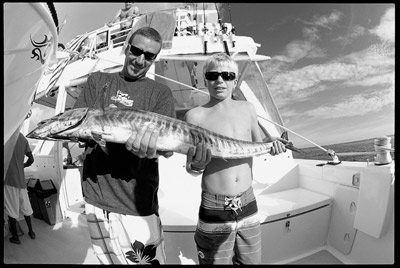
Photo: Kenworthy / A-Frame
This is, after all, Dino the surf dad, Dino the “overbearing” parent, Dino the guy who, from the time his son started competing, until very recently, was at nearly every single event whispering in the golden phenom’s ear. But no one wants to talk about love, not sober, not with a stranger who’s going to splash it into a magazine article.
Romance, passion, lust, these things are easier to describe. We can hide behind our Shakespearean platitudes and empty, mugging machismo. There is no cliché for the brutal, beautiful bonds between men and certainly no convenient vocabulary to describe the nexus of creative destruction that binds fathers and sons. Instead we have firm handshakes and slaps on the back, praises whispered just below hearing level and the pregnant silences of words left unsaid.
A mother is allowed to dote, to worry, to pour herself unreservedly into her children’s lives no matter what their age or stature. But a father is expected to have better things to care about, like a job, or his car or what his favourite sports team is doing this weekend.
But there are those who are unable, for a variety of reasons, to toe that particular line. Dino is one of these people, and he, along with Christopher Moore (Carissa’s Dad) and Charles Medina (Gabriel’s step dad), among others, have gained an uneasy reputation in the surf world as “strong” dads. In a demimonde that likes to paint itself as carefree and blithely indifferent to competition, this is not a title to cherish. It carries with it the un-surfy connotations of sporting parents the world over, too involved with their kids, too “aggro” about competing, too, well, serious.
Dino is aware of the whispers and doesn’t really want to get deep with me on the phone. Out of habit, more than any particular evasiveness, he keeps slipping back into press conference cant about life being a journey and trying to teach his son to enjoy it. I doubt that what he’s saying is false but I’m after something else, something I think he and I, because of an unexpected similarity in our lives, understand or intuit on a level far beyond the reach of most.
Eventually, I break journalistic convention and admit something to him, something I’ve only ever told my wife.
“My dad said something very similar, you know, about worrying about your kids.”
What my father said and what I tell Dino, is this: “You know, life is full of pain and having children is one of the most painful things you can do. Of course, they bring you a lot of joy, but no matter what happens, wherever they go, or how old they get, you will never stop worrying about them. When you tell me not to worry about you, it shows me how young you really are because you can’t truly understand what it’s like to love a child, to worry about a child until you have one of your own. When people say they don’t worry about their children anymore because they’re grown up, I think maybe they don’t love their children as much as I do. ”
“Exactly!” Dino Says. “Until you’re a parent you just don’t know. All these haters can say this and that, they don’t have any idea.”
My father, Shun Endo and Dino Andino were born in very different places but into similar circumstances. One was the son of a ne’er do well alcoholic in a small Japanese fishing village. The other the son of ne’er do well drug addict in a Cali town. Neither had a strong male role model, both had to grind for nearly everything they got out of life. Both had sons and both decided, quietly but firmly, to give their sons the type of parenting that they had always felt cheated of. Finally and crucially, both are men of uncommon conviction.
Dino, perhaps due to his own childhood neglect, never planned to have a surf champion son. “My wife made the hard decisions about having kids,” he says. “She said, ‘Either we do this or I don’t ever want to see you again.’” Dino stayed and before long, he was travelling the world for Billabong and Oakley with a little boy following his every move.
They both loved it. By the time Kolohe started competing Dino insisted on taking him to every competition which meant driving up and down the coast of California every weekend, sometimes eight hours at a stretch. “I always wanted to be the dad I never had,” says Dino of that time. “I wasn’t going to just pawn Kolohe off on some other parents and leave him by himself for the weekend.”
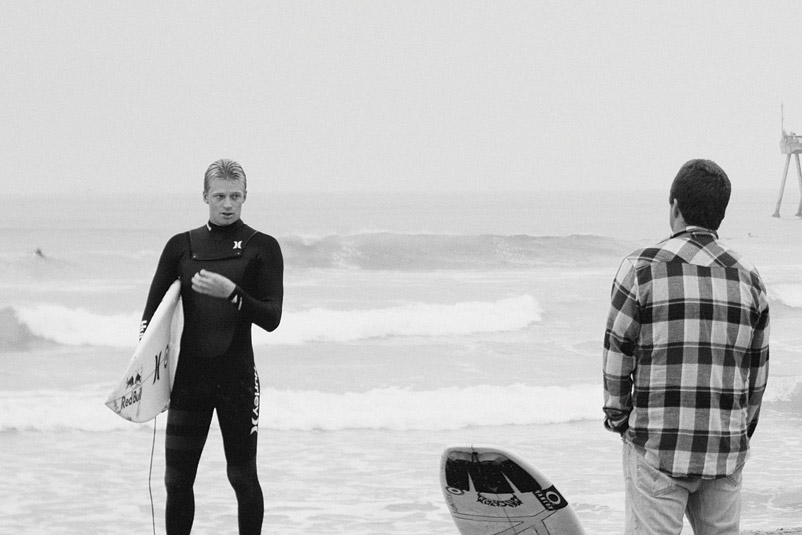
“I worry about Kolohe on every level,” admits Dino. “When he’s doing airs into the flats, when he’s surfing big waves, when he’s not surfing well, when he’s getting down on himself… I’m obsessive compulsive and although I don’t think I worry about him in a bad way, I worry about him all the time.”
There are two types of parents at every junior sporting event in America: the ones that sit around chatting with each other and enjoying themselves and the ones that have to get involved. Dino was one of the latter. If he invested more of himself in his child it was certainly out of disposition but also because through serendipity and genes he had a more valuable investment.
From the time Kolohe was about 12 it was apparent that he was preternaturally talented, both in physical ability and in drive. And so Dino was faced with an unexpectedly difficult decision. Should he allow his son to take his own course and perhaps end up a very good local or national level surfer or should he gamble and push him to be one of the best that ever lived? “I’m already really, really proud of the kid and always have been,” he says. “But I know what he wants deep down inside and it’s up to me, as his father, to help him get.”
I started playing tennis when I was nine and found that I was pretty good. I quickly became better than the kids in my Ohio town, then better than the adults, then better than most kids in the district, then region, and by the time I was 14 I was playing tournaments on a national level.
Shun was with me nearly all the time and nearly all of the time we were screaming at each other. He was my coach, my trainer, my task-master and the man in my corner during matches. On top of all these things he was my father. Somehow, instead of complimenting each other, his dual roles of father and coach seemed to detract from one another. He was too much my father to be a coach and too much a coach to be my father. Our shouting matches during practice on the public courts near my high school became a joke to my friends, and embarrassment to my mother, and matter of concern for the gossip mongers of the neighbourhood.
He pushed me and he pushed me and he kept pushing me. I didn’t always like it but I never broke. Instead, I gulped down the pressure and relished the feeling of being able to handle anything that was thrown at me. It was a way of learning, of growing. Not a particularly pleasant way but one that still, on some strange, visceral level, makes more sense to me than any other.
Dino pushed Kolohe too, especially in big waves. He recounts one memorable morning paddling out at before sunrise at eight-foot J-bay with the nine-year-old boy and having a sneaker set land on their heads. When they both surfaced Dino had the unenviable job of coaxing the terrified child back out to the lineup.
“I think most of all, I’ve always wanted to push him to realise his potential,” Dino says, chuckling at the memory. “Both as an athlete, and as a person.”
Sounds like another throwaway line, doesn’t it? But think, for just a moment, how complicated a task it is to be both the father of an exceptionally talented child and the teacher responsible for the full realisation of that talent. The father wants to love and be loved, the teacher wants to train the child to be the best. Sooner or later that will mean asking the creature you love more than anything else in the world, more than yourself even, to push himself past his own limits, to break his body and mind on the mill of his chosen discipline, to gulp the bile of defeat, vomit it back up and ask for more. You will argue viciously with him, criticise his every shortcoming and deny him so many of the little pleasures of childhood that your relationship will be forever tinged with the blood spilt during countless, half-remembered battles.
And you will do all of this for him, out of love, or some iteration of it that is so strange it doesn’t even make sense to you half the time. That is, after all, what “potential” is all about. The greater potential a child has, the harder and more painful his road to realisation will be. If you choose to walk it with him, to push him relentlessly he may one day be what he has the talent to be, but he will never love you like he would have if you had just left him alone.
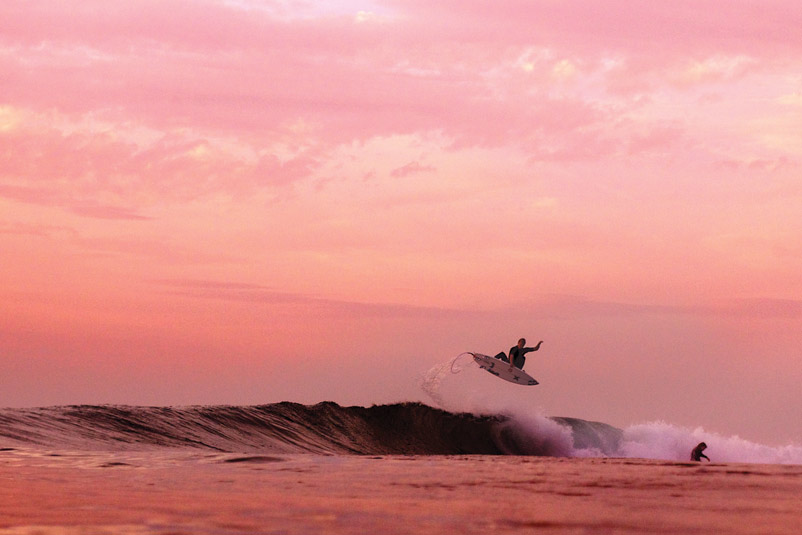
“I think most of all, I’ve always wanted to push him to realise his potential,” Dino says of Kolohe. “Both as an athlete, and as a person.”
It’s troubling, this cycle, in the way it embodies a love so distilled, so uncompromising, that it has to hurt those it touches. But also remember this: the race horse wants to run. All great athletes share the ability to savour the strange torture of being ordered to perform beyond the limits of their own abilities, in other words, to be pushed in a way that borders on both physical and emotional abuse.
I am not a great athlete, just a few steps above average, but I realised very early on that I thrived on this type of pressure from the authority figures in my life. I watched other tennis players break down in tears when their parents harangued them whereas I took the criticisms of my own father as a challenge to improve. While some skipped practice or cut corners on their conditioning, there was nothing I wouldn’t attempt if challenged by a coach or parent. It sounds ridiculous now, but I took it as a matter of pride that my father would take me out to country roads at night when it was snowing, kick me out of the car and have me jog while he drove slowly behind with the high beams on. To be sure I hated him for it, but I loved the challenge. Whereas I can only speculate about Kolohe, I think anyone who takes an eight footer on the head at pre-dawn J-bay at nine years old and then paddles back out is also guilty on some level, of savouring the challenge.
Through hard work, talent, luck, and a bond that will always be slightly mysterious, even I expect, to them, Kolohe and Dino have succeeded far beyond what most people ever achieve in their given fields. But now comes the trickiest act of their domestic drama, the one where Dino takes his bow and Kolohe carries the show on without him. “I’m a bit burnt out from travelling with him,” Dino says. “I still do it some, but too much input from me isn’t that good for him and by this point he usually knows exactly what I’m thinking anyway. I can’t tell him much anymore and he usually doesn’t want to hear it anyway so I mostly help him with his boards, that’s where I can really still give a lot of input ”
My tennis abilities plateaued when I was about 17 and I quit before I went to college. I rarely talk with my dad about the years we spent together on the court. But when I do, he gets a tone in his voice, not quite regret, not quite nostalgia, but a certain longing, like he just wants me to understand what we both put each other through. Maybe I want to hear it in Dino but I swear something of that tone filters into his voice when I ask him what advice he would give me if I wanted my son or daughter to play sports.
“I think the main thing is that you let the kid know that they are number one in your mind. As long as they try their hardest and they do their best, that’s all that really matters. That’s really hard to do but it’s the most important thing to do. It’s hard when you’re caught up in the middle of saying ‘If you didn’t do this that wouldn’t have happened’ or ‘What were you thinking when you did this or didn’t do this?’ but I think the best parents are supportive first and foremost. It’s very hard to do. But if you can achieve that and keep them coming to you for assurance then you’re winning.” Dino pauses. “But when you’re a parent you never know. You think you’re doing it right and you’re trying your hardest, but you never really know.”
We must all, at some point, take stock of our lives and attempt to untangle the strands of ourselves from the ones knotted up with our families, if not to lose them entirely, then to solidify who we are apart from them. A strong, sporting father, with the almost terrible love and devotion he represents, is among the hardest people to excise from the soul. From a young age you share two parts of the same life: the same triumphs and the same defeats, the same struggles and the same dreams. You fight the same battles with the best and worst parts of yourselves. When this relationship ends, as it must inevitably end, perhaps the most this type of man can hope for is not to be loved unreservedly, but to still see something of himself in the adult that was once his child, and if it isn’t the best of him, then at least it isn’t the worst.


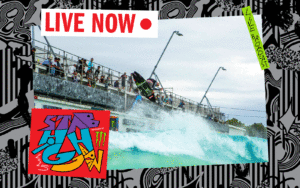
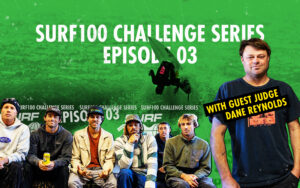










Comments
Comments are a Stab Premium feature. Gotta join to talk shop.
Already a member? Sign In
Want to join? Sign Up